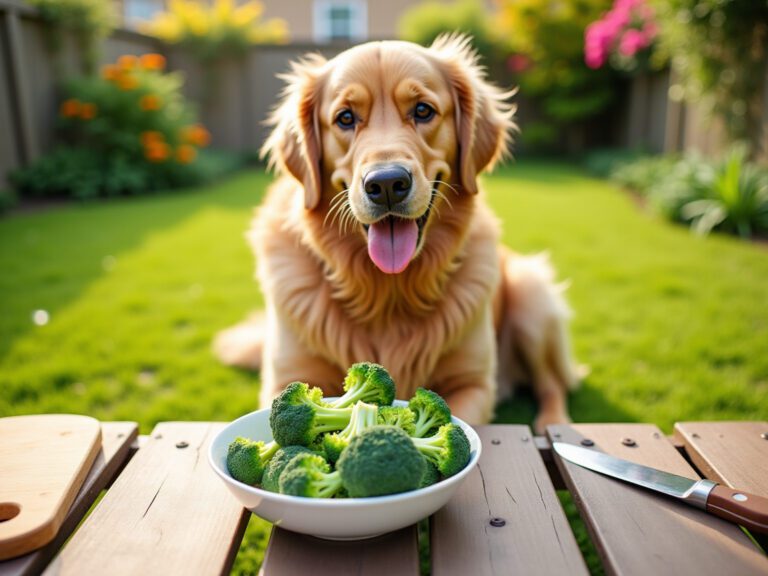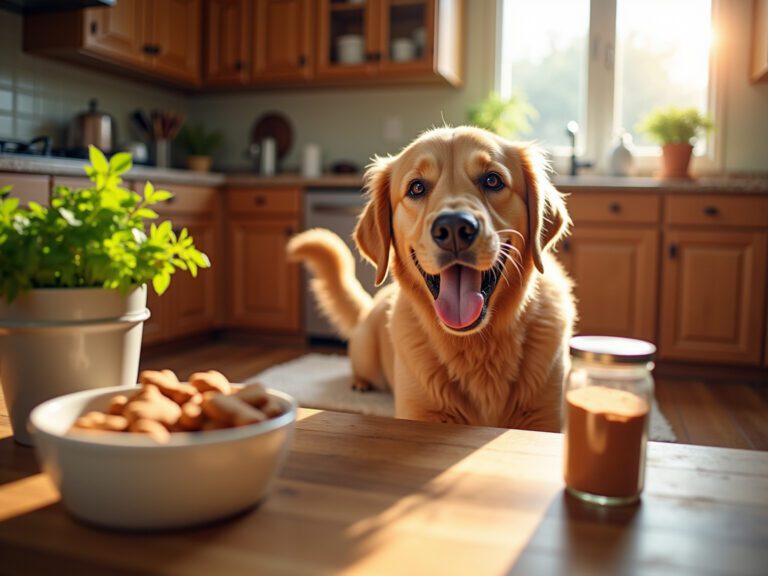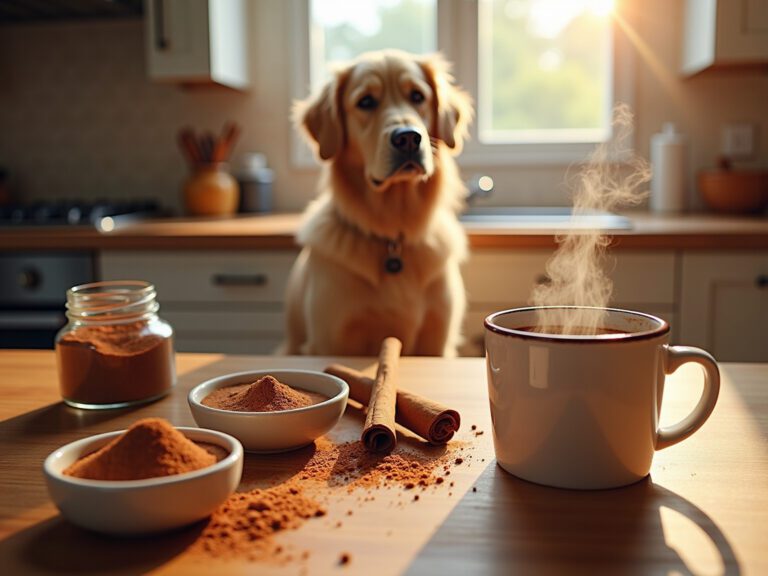My Dog’s Stomach Gurgling Like Crazy and He Won’t Eat: Solutions
Overview
This article addresses a common concern for pet owners: the unsettling issue of a dog’s stomach gurgling and loss of appetite. Recognizing these symptoms is crucial, as they may indicate underlying conditions that need attention. We understand how worrying it can be when your furry family member seems unwell, and we’re here to help you navigate these challenges.
At Adventure Den, we provide practical solutions to encourage your dog to eat and alleviate any discomfort they may be experiencing. It’s important to remember that a nurturing environment can make all the difference in your pet’s recovery. Additionally, we offer guidelines on when to seek veterinary care, ensuring you know when to act. If your dog exhibits persistent symptoms or severe signs, please don’t hesitate to seek immediate attention to safeguard their health and well-being.
Your pet deserves the best care possible, and we are committed to supporting you every step of the way. Together, we can ensure that your beloved companion feels better and returns to their happy, playful self.
Introduction
Understanding your furry family member’s health can be a perplexing journey, especially when faced with unsettling signs like stomach gurgling and a refusal to eat. These symptoms, often indicative of underlying gastrointestinal issues, can leave pet owners feeling anxious and unsure about the best course of action. This article delves into the causes of these distressing symptoms and offers practical solutions to encourage appetite and alleviate discomfort.
But when does a simple upset stomach warrant a visit to the veterinarian? Exploring this crucial question can empower you to take proactive steps in safeguarding your beloved companion’s health.
Identify Symptoms of Stomach Gurgling and Loss of Appetite
To effectively address your dog’s stomach gurgling and loss of appetite, it’s essential to observe the following symptoms:
-
Gurgling Sounds: Pay close attention to any unusual noises from your dog’s stomach. These sounds can indicate digestive disturbances, and it’s important to remember that gastrointestinal problems are quite common. Many canines, including my dog’s stomach gurgling like crazy and he won’t eat, exhibit signs due to underlying conditions, so your awareness is crucial.
If your furry family member is refusing food or showing disinterest in meals, like my dog’s stomach gurgling like crazy and he won’t eat, this can be a significant indicator of health issues. Research shows that roughly 28% of dogs experience a decreased desire for food during gastrointestinal distress, highlighting the importance of monitoring this behavior.
When observing behavioral changes, look for signs of lethargy, restlessness, or discomfort, which may occur alongside my dog’s stomach gurgling like crazy and he won’t eat. It’s noteworthy that 24% of dogs were reported to be lethargic during such episodes. Veterinary experts remind us that “awareness, not alarm, is crucial in these situations,” so staying observant is key. -
Gastrointestinal Distress: Additional signs like vomiting, diarrhea, or excessive drooling can indicate more serious conditions. A study revealed that diarrhea is the most frequently registered problem, with a recorded prevalence of concurrent vomiting and diarrhea at 10.1%. Thankfully, over 80% of diarrhea cases resolve with just one vet visit, indicating that prompt attention can lead to a quick recovery.
By closely observing these signs, you can gather important information about your dog’s condition and decide on the suitable next actions. Remember, your attentiveness plays a vital role in ensuring your pet’s well-being.

Explore Common Causes of Stomach Gurgling and Anorexia in Dogs
Various factors can lead to my dog’s stomach gurgling like crazy and he won’t eat, each impacting his health differently. Understanding these potential causes is crucial for determining whether your dog’s symptoms are temporary or necessitate veterinary intervention.
-
Dietary Indiscretion: Dogs often consume inappropriate items, such as garbage or foreign objects, leading to gastrointestinal upset. This behavior, commonly referred to as ‘garbage gut,’ can result in symptoms ranging from mild discomfort to severe health issues. It’s important to monitor what your furry family members are eating to prevent these situations.
-
Gastrointestinal Disorders: Conditions such as inflammatory bowel disease (IBD), colitis, and gastroenteritis are common in canines. In fact, gastroenteritis impacts around 41.2% of ill canines and 23.7% of the total population examined. These disorders can interfere with normal digestion, resulting in my dog’s stomach gurgling like crazy and he won’t eat, making it vital to consult your veterinarian if you notice these signs.
-
Stress and Anxiety: Environmental changes or disruptions in routine can induce stress in canines, negatively affecting their appetite and digestive health. Seeking veterinary advice on behavior management can help mitigate the recurrence of these issues. Remember, stress-related gastrointestinal problems are not uncommon and can exacerbate existing conditions.
-
Intestinal Parasites: Intestinal parasites, such as Ancylostoma, can cause significant discomfort, resulting in symptoms like my dog’s stomach gurgling like crazy and he won’t eat. The prevalence of gastrointestinal nematodes in dogs has been noted at around 23.03%, with Ancylostoma observed in 9.31% of sampled dogs. This highlights the importance of regular deworming and preventive care to keep your pet healthy and happy.
-
Serious Health Issues: Serious health issues, including pancreatitis and tumors, may also manifest with symptoms such as my dog’s stomach gurgling like crazy and he won’t eat. These conditions require prompt veterinary attention to ensure proper diagnosis and treatment.
By being aware of these factors and observing your dog’s behavior, you can take proactive steps to ensure their well-being. If you have any concerns about your pet’s health, do not hesitate to seek help from your trusted veterinarian.

Implement Solutions to Encourage Eating and Relieve Stomach Discomfort
To help your furry family member feel better and encourage them to eat, consider these nurturing strategies:
- Bland Diet: Introduce a bland diet of plain boiled chicken and rice or pumpkin puree, served without oils, butter, or seasonings. This soothing approach provides essential nutrition while being gentle on their stomach. It’s a commonly suggested method for dogs experiencing digestive issues.
- Hydration: Ensure your dog has access to fresh water at all times. Dehydration can worsen their condition, so it’s vital to keep an eye on their water intake, especially if they are not eating well.
- Small, Frequent Meals: Instead of large meals, offer smaller portions throughout the day. This can ease digestion and help your dog consume food more comfortably.
- Food Toppers: Enhance the appeal of their meals by adding dog-safe broth or a small amount of wet food. This can entice dogs with reduced appetite to eat more eagerly.
- Encouragement: Use positive reinforcement, like praise or gentle encouragement, to motivate your dog to eat. Creating a positive connection with mealtime can enhance their desire to eat.
- Calm Environment: Minimize distractions during mealtime to create a stress-free eating environment. A quiet, comfortable space can help your dog feel more at ease while enjoying their food.
- Probiotics: Consider incorporating probiotics into your dog’s diet to help restore good bacteria in their digestive system, especially after gastrointestinal upset.
- Food Journal: Keep a food journal to track your dog’s intake and any symptoms for vet visits. This can be invaluable for monitoring their condition and discussing it with your veterinarian.
By applying these compassionate solutions, you can alleviate your dog’s discomfort and encourage their appetite, fostering a smoother recovery.

Recognize When to Consult a Veterinarian for Serious Concerns
Recognizing when your furry family member needs veterinary care is vital for their well-being. It’s important to be vigilant for the following signs:
- Persistent Symptoms: If your dog is experiencing stomach gurgling and a loss of appetite that lasts more than 24 hours, it’s time to consult a veterinarian.
- Severe Vomiting or Diarrhea: Frequent vomiting or diarrhea, especially with blood present, can indicate a serious underlying issue that requires immediate attention.
- Lethargy: Unusual lethargy or unresponsiveness may signal a medical emergency that needs prompt veterinary care.
- Abdominal Pain: Look for signs of discomfort, such as whining, pacing, or a tense abdomen, which should prompt immediate veterinary evaluation.
- Dehydration: Signs of dehydration, like dry gums or excessive panting, are serious and warrant contacting your vet without delay.
Understanding these indicators can help ensure your dog receives the prompt and essential care they need, potentially preventing more serious medical problems later on. Recent statistics reveal that veterinary visits for dogs have increased from 119.4 million to 130.4 million, reflecting a growing awareness among pet owners about the importance of veterinary care. Additionally, 69% of pet owners view pet parenting as practice for starting a family, highlighting the emotional investment in their pets’ well-being. As American consumers spent $38.3 billion on veterinary care and products in 2023, prioritizing veterinary visits for concerning symptoms is crucial for maintaining your pet’s health.
Conclusion
Recognizing and addressing the signs of stomach gurgling and loss of appetite in dogs is crucial for their health and well-being. It’s essential to understand that these symptoms can indicate various underlying conditions, allowing you to take timely action. By being attentive and observant, you can effectively monitor your dog’s behavior and make informed decisions regarding their care.
This article emphasizes the importance of:
- Identifying symptoms
- Exploring common causes
- Implementing nurturing solutions
- Knowing when to consult a veterinarian
From dietary indiscretions and gastrointestinal disorders to stress and serious health issues, the factors influencing a dog’s digestive health are diverse. Strategies such as:
- Introducing a bland diet
- Ensuring hydration
- Creating a calm eating environment
can significantly support your dog’s recovery and encourage them to eat.
Ultimately, the health of your beloved pet is a priority that requires vigilance and proactive care. By staying informed and responsive to their needs, you can foster a supportive environment that promotes recovery and well-being. Remember, when in doubt, seeking veterinary advice is not just a precaution; it is a vital step in ensuring that your furry family members lead happy and healthy lives.
Frequently Asked Questions
What are the main symptoms of stomach gurgling in dogs?
The main symptoms include unusual gurgling sounds from the dog’s stomach, loss of appetite, lethargy, restlessness, and discomfort.
What does it mean if my dog is gurgling and not eating?
If your dog is gurgling and refusing food, it may indicate underlying health issues, as gastrointestinal problems are common in dogs.
How common is a loss of appetite in dogs experiencing gastrointestinal distress?
Research shows that approximately 28% of dogs experience a decreased desire for food during gastrointestinal distress.
What behavioral changes should I look for in my dog?
Look for signs of lethargy, restlessness, or discomfort, as 24% of dogs have been reported to be lethargic during episodes of gastrointestinal distress.
What additional signs might indicate more serious gastrointestinal issues?
Additional signs include vomiting, diarrhea, and excessive drooling, which could suggest more serious conditions.
How prevalent is diarrhea in dogs with gastrointestinal issues?
Diarrhea is the most frequently registered problem, with a recorded prevalence of concurrent vomiting and diarrhea at 10.1%.
What should I do if my dog shows these symptoms?
Closely observe the signs and consider seeking veterinary attention, as over 80% of diarrhea cases resolve with just one vet visit, indicating that prompt attention can lead to a quick recovery.







